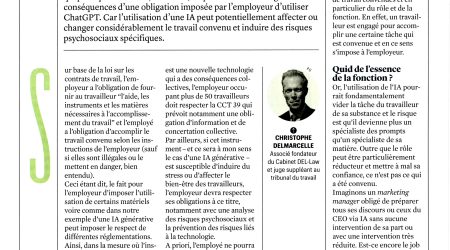Does Audi Brussels have the right to terminate the information phase of the ‘Renault proceedings’?
Posted the 16 January 2025In connection with the closure of the Brussels site, management has unilaterally ended the information and consultation phase. The unions are protesting. Is this legal?
Audi Brussels will close its doors on 27 February 2025.
On 12 December, the management announced unilaterally ending the information and consultation phase. This much to the displeasure of the unions, who are asking to bypass the procedure and return to the negotiating table. This raises the question of the legality of this decision to end the information and consultation phase.
As a reminder, according to the famous ‘Renault procedure’, introduced almost 25 years ago after the closure of the Renault plant in Vilvoorde and organised by the law of 13 February 1998 (Article 66), two phases must be distinguished.
The first is the information and consultation phase, which starts with the announcement of the intention to proceed with collective redundancies and in which the employer must inform the workers of the reasons justifying this intention, allow them to ask questions about the planned collective redundancies and formulate arguments or counter-proposals on this and respond to them.
The second phase is the social plan negotiation phase, which starts with the announcement of the decision to proceed with mass layoffs.
These two phases differ in terms of their purpose and especially their timing. The law sets no deadline for the completion of the first phase, while a maximum period of 30 days (extendable to 60) is provided for the second phase.
Strategically, unions thus try to ‘pollute’ the information and consultation phase by trying to start negotiating the dismissal plan so as not to be bound by a restrictive timetable. They may thus try to stretch this initial phase - in some cases to 6 or even 9 months.
Nothing in the law prevents employers from unilaterally ending the information and consultation phase, although they will generally seek the consent of employee representatives. Termination by mutual agreement is in fact the safest solution for the employer, but if the workers' representatives refuse, he can decide on his own responsibility to end the information and consultation process if he considers that he has sufficiently informed the workers and answered all their questions and requests.
In dat geval zal de werkgever ervoor gezorgd hebben dat dit bewezen werd, met name via de notulen van de ondernemingsraad. Als de personeelsvertegenwoordigers niet akkoord gaan met het einde van de informatie- en raadplegingsfase (of deze betwisten), opent dit de mogelijkheid voor de werknemers om dit individueel aan te vechten, bijvoorbeeld om schadevergoeding te krijgen, zoals in het geval van de sluiting van Continental in Herstal in 2001 (208 werknemers kregen elk een schadevergoeding van 5000 euro - Arbeidsrechtbank - Arrest nr. F-20070430-3 (32872/04) van 30 april 2007). En dan hebben we het nog niet eens over het risico van sancties voor het niet naleven van de wetgeving inzake collectief ontslag, waarvoor sinds 1 juli 2024 een verzwaarde straf van niveau 3 geldt in overeenstemming met artikel 193 van het Sociaal Strafwetboek.
Related articles

Is an employer allowed to mandate the use of artificial intelligence tools by employees ? (Trends, 17-07-2025)

Caution if a former colleague opposed to your employer asks you to testify in their favor
